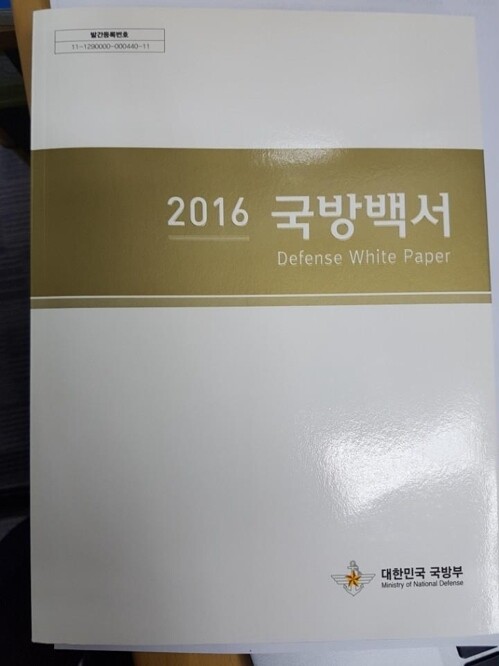hankyoreh
Links to other country sites 다른 나라 사이트 링크
South Korean government considers deleting language that describes North Korea as enemy

The South Korean government is considering deleting a phrase from this year’s biennial Defense White Paper which states “the North Korean regime and military are our enemies.”
In a text message sent to accredited journalists on Aug. 22, the Ministry of National Defense stated, “We expect to make a decision when the Defense White Paper is released in December after careful deliberation on the expressions used towards the North Korean military.”
Earlier on the same day, a Yonhap News article quoted a high ranking government official as saying, “We are actively considering deleting the phrase ‘the North Korean regime and military are our enemies’ from the 2018 Defense White Paper which will be released at the end of the year.”
The text message from the ministry was a response to this report, but did not attempt to refute the claim.
This phrase has been present in the Defense White Paper ever since it was added in 2010 in the wake of the ROKS Cheonan sinking and North Korean shelling of Yeonpyeong Island. In the 2016 Defense White Paper, the second chapter on national security strategy and defense policy stated “North Korea’s habitual military threats and provocations are a primary threat to South Korean security, and WMDs, including nuclear weapons and missiles, cyber-attacks and terrorist threats in particular present a grave threat to our security. As long as these threats persist, the North Korean regime and military that perpetrate such actions are our enemies.”
The move to delete the phrase is based on the government’s decision that such wording is not in line with the purpose of the April 27 Panmunjeom Declaration, which stipulates “South and North Korea agreed to completely cease all hostile acts against each other.”
On this point, a government official stated “the use of this expression in an official government publication contradicts the Panmunjeom Declaration, which stipulates that both Koreas will discuss measures to put an end to hostile acts. I have been informed that we are currently seeking different wording that sufficiently articulates the North Korean military threat without using the word ‘enemy.’”
Another factor that played into this decision is the fact that the military threat has been downgraded this year with North Korea practically putting an end to nuclear tests and missile launches. The use of the word “enemy” in the 2016 Defense White Paper came at a time when North Korea was engaging in persistent military threats, including nuclear tests and missile launches, and it is clear that the use of the expression was conditional. It appears that the government left itself enough wiggle room to delete the word “enemy” if North Korea’s military provocations and threats were to decrease or cease altogether.
In the past, there have been several controversies over the language used to refer to North Korean in Defense White Papers, including the expression “main enemy.” This expression was first used to describe the North Korean military in the 1995 Defense White Paper after North Korean representative Park Yeong-soo threatened to turn Seoul into a “sea of fire” in March 1994 during a working-level meeting for special inter-Korean envoys, and the same wording was repeated in documents released at a later date.
However, after the first Inter-Korean summit meeting in 2000, the expression “main enemy” became subject to controversy and was deleted from the 2004 Defense White paper.
By Park Byong-su, senior staff writer
Please direct comments or questions to [english@hani.co.kr]

Editorial・opinion
![[Column] Welcome to the president’s pity party [Column] Welcome to the president’s pity party](https://flexible.img.hani.co.kr/flexible/normal/500/300/imgdb/original/2024/0515/3917157400447943.jpg) [Column] Welcome to the president’s pity party
[Column] Welcome to the president’s pity party![[Editorial] Korea must respond firmly to Japan’s attempt to usurp Line [Editorial] Korea must respond firmly to Japan’s attempt to usurp Line](https://flexible.img.hani.co.kr/flexible/normal/500/300/imgdb/original/2024/0514/2317156736305813.jpg) [Editorial] Korea must respond firmly to Japan’s attempt to usurp Line
[Editorial] Korea must respond firmly to Japan’s attempt to usurp Line- [Editorial] Transfers of prosecutors investigating Korea’s first lady send chilling message
- [Column] Will Seoul’s ties with Moscow really recover on their own?
- [Column] Samsung’s ‘lost decade’ and Lee Jae-yong’s mismatched chopsticks
- [Correspondent’s column] The real reason the US is worried about Chinese ‘overcapacity’
- [Editorial] Yoon’s gesture at communication only highlights his reluctance to change
- [Editorial] Perilous stakes of Trump’s rhetoric around US troop pullout from Korea
- [Guest essay] Preventing Korean Peninsula from becoming front line of new cold war
- [Column] The state is back — but is it in business?
Most viewed articles
- 1[Column] Welcome to the president’s pity party
- 2Could Korea’s Naver lose control of Line to Japan?
- 3[Editorial] Transfers of prosecutors investigating Korea’s first lady send chilling message
- 4US has always pulled troops from Korea unilaterally — is Yoon prepared for it to happen again?
- 5Major personnel shuffle reassigns prosecutors leading investigations into Korea’s first lady
- 6Naver’s union calls for action from government over possible Japanese buyout of Line
- 7[Editorial] Korea must respond firmly to Japan’s attempt to usurp Line
- 8[Column] Will Seoul’s ties with Moscow really recover on their own?
- 9S. Korean first lady likely to face questioning by prosecutors over Dior handbag scandal
- 10In Yoon’s Korea, a government ‘of, by and for prosecutors,’ says civic group